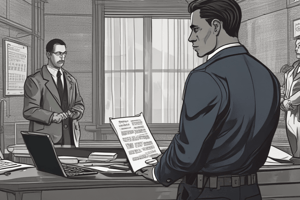Podcast
Questions and Answers
What did the Supreme Court decide in Miranda v. Arizona?
What did the Supreme Court decide in Miranda v. Arizona?
- The accused person has the right to remain silent only if they are informed by the attorney.
- The accused person has the right to remain silent only if the police provide a lawyer.
- The accused person has the right to remain silent under the Fifth Amendment. (correct)
- The accused person has the right to remain silent, but only if they are not in custody.
What is 'custodial interrogation' as referred to by the Supreme Court?
What is 'custodial interrogation' as referred to by the Supreme Court?
- Questioning initiated by lawyers after a person has been taken into custody.
- Questioning initiated by law enforcement officers before a person has been taken into custody.
- Questioning initiated by law enforcement officers after a person has been taken into custody. (correct)
- Questioning initiated by lawyers before a person has been taken into custody.
Under what conditions may the accused waive effectuation of their rights according to Miranda v. Arizona?
Under what conditions may the accused waive effectuation of their rights according to Miranda v. Arizona?
- The waiver must be made without any requirement for an attorney's presence.
- The waiver must be made voluntarily, knowingly, and intelligently. (correct)
- The waiver must be made without any formal process involved.
- The waiver must be made involuntarily, unknowingly, and unintelligently.
What is considered 'custodial interrogation' in the context of Miranda v. Arizona?
What is considered 'custodial interrogation' in the context of Miranda v. Arizona?
In what situation must police cease questioning a juvenile?
In what situation must police cease questioning a juvenile?
Why does imprisonment alone not constitute custody under Miranda?
Why does imprisonment alone not constitute custody under Miranda?
When does the Sixth Amendment right to counsel attach?
When does the Sixth Amendment right to counsel attach?
What happens once the Sixth Amendment right attaches for a given charge?
What happens once the Sixth Amendment right attaches for a given charge?
What is important for police to do before asking an inmate about events unrelated to incarceration?
What is important for police to do before asking an inmate about events unrelated to incarceration?
What is an example of when a prosecution is initiated for Sixth Amendment purposes?
What is an example of when a prosecution is initiated for Sixth Amendment purposes?
For what purpose does Miranda hold that inherently compelling pressures exist during custodial interrogation?
For what purpose does Miranda hold that inherently compelling pressures exist during custodial interrogation?
What must officers avoid doing once the Sixth Amendment right attaches for a given charge?
What must officers avoid doing once the Sixth Amendment right attaches for a given charge?
What does Miranda require before questioning a prisoner about events unrelated to incarceration?
What does Miranda require before questioning a prisoner about events unrelated to incarceration?
What is essential for determining whether coercive police conduct occurred when a juvenile was taken into custody?
What is essential for determining whether coercive police conduct occurred when a juvenile was taken into custody?
What is the term used to refer to questioning initiated by law enforcement officers?
What is the term used to refer to questioning initiated by law enforcement officers?
In what case was it ruled that the question 'why are you running' constituted a custodial interrogation?
In what case was it ruled that the question 'why are you running' constituted a custodial interrogation?
According to the text, what must happen if a suspect invokes his or her Miranda rights but later reinitiates communication?
According to the text, what must happen if a suspect invokes his or her Miranda rights but later reinitiates communication?
In which case was it stated that routine booking questions designed to lead to essential biographical data are not considered interrogation?
In which case was it stated that routine booking questions designed to lead to essential biographical data are not considered interrogation?
What was the ruling in Clark v. State regarding a suspect's invocation of the right to remain silent?
What was the ruling in Clark v. State regarding a suspect's invocation of the right to remain silent?
In which case was it ruled that police may not circumvent the Miranda requirement by using a 'two-step' interview technique?
In which case was it ruled that police may not circumvent the Miranda requirement by using a 'two-step' interview technique?
What type of questions designed to lead to essential biographical data are not considered interrogation?
What type of questions designed to lead to essential biographical data are not considered interrogation?
In which case did the Florida Supreme Court state that a Miranda interrogation by police after the person signed a claim of rights form at or shortly before a first appearance hearing is valid?
In which case did the Florida Supreme Court state that a Miranda interrogation by police after the person signed a claim of rights form at or shortly before a first appearance hearing is valid?
What did the court rule about routine booking questions in Allred v. State?
What did the court rule about routine booking questions in Allred v. State?
What does the Court inquire about to decide whether Miranda applies?
What does the Court inquire about to decide whether Miranda applies?
What happens when a suspect's un-Mirandized statements are voluntary according to Oregon v. Elstad and State v. Ernst?
What happens when a suspect's un-Mirandized statements are voluntary according to Oregon v. Elstad and State v. Ernst?
What does Lebron v. State state about a single pre-Miranda statement made by an agent to a defendant?
What does Lebron v. State state about a single pre-Miranda statement made by an agent to a defendant?
What factor will the court consider when examining the totality of the circumstances surrounding the waiver?
What factor will the court consider when examining the totality of the circumstances surrounding the waiver?
According to the 'Edwards Rule', when must the questioning cease immediately?
According to the 'Edwards Rule', when must the questioning cease immediately?
What did the U.S. Supreme Court rule in the case of Minnick v. Mississippi regarding the 'Edwards Rule'?
What did the U.S. Supreme Court rule in the case of Minnick v. Mississippi regarding the 'Edwards Rule'?
When does the 'Edwards Rule' no longer apply according to Maryland v. Shatzer?
When does the 'Edwards Rule' no longer apply according to Maryland v. Shatzer?
In Davis v. U.S., what statement by the defendant was considered not a request for counsel?
In Davis v. U.S., what statement by the defendant was considered not a request for counsel?
What type of statement by a suspect waives the right to remain silent according to Berghuis v. Thompkins?
What type of statement by a suspect waives the right to remain silent according to Berghuis v. Thompkins?
When may police resume questioning after a suspect invokes the right to remain silent?
When may police resume questioning after a suspect invokes the right to remain silent?
What happened in Ahedo v. State when the defendant initiated a new conversation about two hours after invoking the right to remain silent?
What happened in Ahedo v. State when the defendant initiated a new conversation about two hours after invoking the right to remain silent?
What was held in Jones v. State regarding defendant's request "to arrange to either [sic] for the attorney to see my mother or for me to see my mother"?
What was held in Jones v. State regarding defendant's request "to arrange to either [sic] for the attorney to see my mother or for me to see my mother"?
What was held in Martin v. State regarding defendant's statement—“I’d rather not talk about it”?
What was held in Martin v. State regarding defendant's statement—“I’d rather not talk about it”?
What did the court rule in Ferguson v. State regarding defendant’s inquiry about his right to counsel: “[i]s this the time I’m supposed to have a lawyer[.]”?
What did the court rule in Ferguson v. State regarding defendant’s inquiry about his right to counsel: “[i]s this the time I’m supposed to have a lawyer[.]”?
What did Daniel v. State hold regarding defendant’s request “Can I have a lawyer.”?
What did Daniel v. State hold regarding defendant’s request “Can I have a lawyer.”?
In Lynumm v. Illinois, when did the defendant's confession become involuntary?
In Lynumm v. Illinois, when did the defendant's confession become involuntary?
According to U.S. v. Patane, what is the admissibility status of physical evidence obtained from a suspect's unMirandized statements?
According to U.S. v. Patane, what is the admissibility status of physical evidence obtained from a suspect's unMirandized statements?
What did the U.S. Supreme Court rule in Colorado v. Connelly regarding suspects who are in pain, intoxicated, or on drugs?
What did the U.S. Supreme Court rule in Colorado v. Connelly regarding suspects who are in pain, intoxicated, or on drugs?
In Taylor v. State, what was the factor that led to the defendant's incriminating statements being admitted into evidence?
In Taylor v. State, what was the factor that led to the defendant's incriminating statements being admitted into evidence?
According to New York v. Quarles, in what instances may statements made by a custodial suspect be admissible even without Miranda warnings?
According to New York v. Quarles, in what instances may statements made by a custodial suspect be admissible even without Miranda warnings?
What did the Court hold in Quarles regarding warning a suspect before asking certain questions?
What did the Court hold in Quarles regarding warning a suspect before asking certain questions?
In Benson v. State, why was the defendant's unwarned response admissible?
In Benson v. State, why was the defendant's unwarned response admissible?
What did Samuel v. State establish regarding misleading a defendant to obtain a confession?
What did Samuel v. State establish regarding misleading a defendant to obtain a confession?
According to Arizona v. Fulmiante, what renders a subsequent statement involuntary?
According to Arizona v. Fulmiante, what renders a subsequent statement involuntary?
In Nelson v. State, what type of information will not render a subsequent confession inadmissible?
In Nelson v. State, what type of information will not render a subsequent confession inadmissible?
Flashcards are hidden until you start studying
Study Notes
Miranda v. Arizona
- The Supreme Court decided that an individual in custody must be informed of their Fifth Amendment rights before being questioned.
- Custodial interrogation refers to questioning by law enforcement officers while the individual is in custody or under arrest.
Conditions for Waiving Rights
- The accused may waive their rights if they voluntarily and knowingly give up their right to remain silent.
- The waiver must be made with full awareness of the right to remain silent and the consequences of giving up that right.
Custodial Interrogation
- Custodial interrogation includes any questioning by law enforcement officers while the individual is in custody or under arrest.
- The questioning does not have to be in a police station or jail, but can occur anywhere the individual is in custody.
Questioning a Juvenile
- Police must cease questioning a juvenile if they invoke their right to remain silent or request an attorney.
Imprisonment and Custody
- Imprisonment alone does not constitute custody under Miranda.
Sixth Amendment Right to Counsel
- The Sixth Amendment right to counsel attaches when the prosecution begins, typically at the initiation of formal charges.
- Once the Sixth Amendment right attaches, the accused has the right to counsel during all critical stages of the prosecution.
Questioning an Inmate
- Before questioning an inmate about events unrelated to incarceration, police must inform them of their rights and obtain a waiver.
Coercive Police Conduct
- Essential for determining whether coercive police conduct occurred when a juvenile was taken into custody is to examine the totality of the circumstances.
Initiation of Communication
- If a suspect invokes their Miranda rights but later reinitiates communication, the police may resume questioning.
Booking Questions
- Routine booking questions designed to lead to essential biographical data are not considered interrogation.
Invocation of Rights
- If a suspect invokes their right to remain silent, police must cease questioning immediately.
Two-Step Interview Technique
- Police may not circumvent the Miranda requirement by using a two-step interview technique.
Voluntary Statements
- If a suspect's un-Mirandized statements are voluntary, they may be admissible in court.
Edwards Rule
- The Edwards Rule states that once a suspect invokes their right to counsel, all questioning must cease immediately.
- The Edwards Rule no longer applies if the suspect initiates a new conversation.
Waiver of Rights
- A suspect's statement can waive their right to remain silent if they make an unambiguous and voluntary request to continue questioning.
- The waiver must be made with full awareness of the right to remain silent and the consequences of giving up that right.
Admissibility of Evidence
- Physical evidence obtained from a suspect's un-Mirandized statements is admissible in court.
- Statements made by a custodial suspect may be admissible even without Miranda warnings if they are made in response to a public safety concern.
Studying That Suits You
Use AI to generate personalized quizzes and flashcards to suit your learning preferences.




